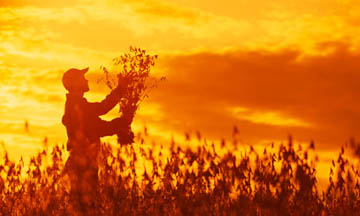

Crowdsourcing the future in Canada
How the wisdom of crowds is reconnecting people and government in British Columbia

Donna Morton: "When ancient art is acid etched on solar panels, when the community says "we own our energy" the world heals". Photograph: MARK GAUTI
The recent Rio+20 Conference taught us again a lesson that we should have learned by now: big governments working with large corporations are incapable of delivering what matters most – healthy children, safe food, air and water, community, fairness, happiness. If we are to master global poverty and climate change, then we must look beyond the institutions that have failed us and tap into Indigenous wisdom – to the insights and practices of people with 10,000-year track record of living sustainability.
In other words, in a "crowdsourcing" era, it's time to tap into the wisdom of crowds – the kind that are ousting old dictators and choosing new leaders, many of them women and Indigenous people. It's time not for talking, but for building communities and economies. It's time for creating jobs and community-owned, clean-energy projects, even while restoring the role of culture and artists in the decision-making process.
The problem – so clearly unresolved in Rio – is one of disconnection between crowds and their governments. "Most governments are stuck in the 20th century ... top down, stable, predictable and all about execution," says Andrea Reimer, councillor, leader of the Green City Action Team in the West coast city of Vancouver.
Cities, on the other hand, are closer to the people. They work well "as a proving ground for resilience and innovation," Reimer says. That's why Vancouver borrows so freely from social innovators, people who she describes ad: "nimble, innovative, creating the future we want, sharing power with the people ... tolerating risks, and supporting mobilized communities."
British Columbia (BC) is complicated, there is an historic disconnect between government and people. In fully 80% of BC, one of Canada's larger provinces, there are no treaties with Indigenous Nations, no paperwork at all. This political mess is also an opportunity; map Indigenous populations globally and you will find the places with most biodiversity. Culture and nature dance; killing one, destroys the other.
This is not peculiar to Canada. The UK also has rich ecosystems of such social innovation. For example, the Hebridean Isle of Eigg, has a diverse and effective leadership of women and men, young and old. No individual appears to claim ultimate authority over the Eigg story. On a recent visit, a crowd of 30 locals helped tell of a people who bought an island from a nasty landlord and built one of the world's cleanest community-owned energy systems. Crowds financed the buyout. Through networks and hard work, they raised £1.5m from 10,000 people, and that was in the 1990's before crowd funding platforms existed.
Eigg has many parallels to Canada's Indigenous communities, including that the Scots measure success by counting young people. Unlike most of the Highlands and Islands that have seen their youth decamp to the cities, Eigg is growing. Lucy Conway of the leaders in the community said that, "Since the buyout, the island population has increased by 25% ... there is now a critical mass under 30 ... broadband allows them to scan the world and put the world of Eigg out there."
Yet globally, indigenous people have been pummelled, first by colonisation and now globalisation – forces that transformed dignified subsistence to dependent impoverishment. Take the Xeni Gwet'in, a First Nations people who live in the unspoiled mountains only a few hundred kilometres north of Vancouver. Xeni Chief Marilyn Baptiste's ancestors have fought corporate and government invasions for hundreds of years and she leads a fight now against a gold mine that would harm a sacred and environmentally important Fish Lake. They are being offered payment, but Baptiste says: "We don't want money, we want our land . . . We have never ceded rights or title to our land … we will not."
Baptiste's people are unconquered, like the wild horses that still run on traditional Xeni territory. They survived being beaten for speaking their language, and still half the elders only speak their native T'silqotin. And now, while fighting Taseko Mine and its supporters – including the BC government – they are also pursuing their own, sustainable path, transitioning to 100% clean energy. It is here that crowds can help – that others can help protect one of the last places filled with Grizzly bears, eagles and wolves.
Unlike the few, often damaging oil-and-gas sector investments in sustainable energy, success is usually far greater when communities co-develop clean energy, using the crowd's wisdom and resources and the artists' vision to support the engineers and the bankers.
We all have ties to older worlds where art and culture were "operating instructions." Our ancestors created stories, cave art, totem poles and standing stones to guide us. They told us not to take too much, to live in harmony with animals and plants, and to honour the abundance of the sun. When ancient art is acid etched on solar panels, when the community says we own our energy, the world heals.
This is our moment; recent ancestors ended slavery and brought the vote to women. We can align ancient parts of us with the future; when elected people listen to elders and crowds.
Donna Morton is chief executive of First Power – a B Corporation inspired by Paul Hawken's Blessed Unrest – that co-develops clean technology, jobs, economy with indigenous communities. She is an Ashoka, Unreasonable and Ogunte fellow, recently winner of the Women's Social Leadership Awards. You can listen to her TEDx talks here. She tweets @First_Power